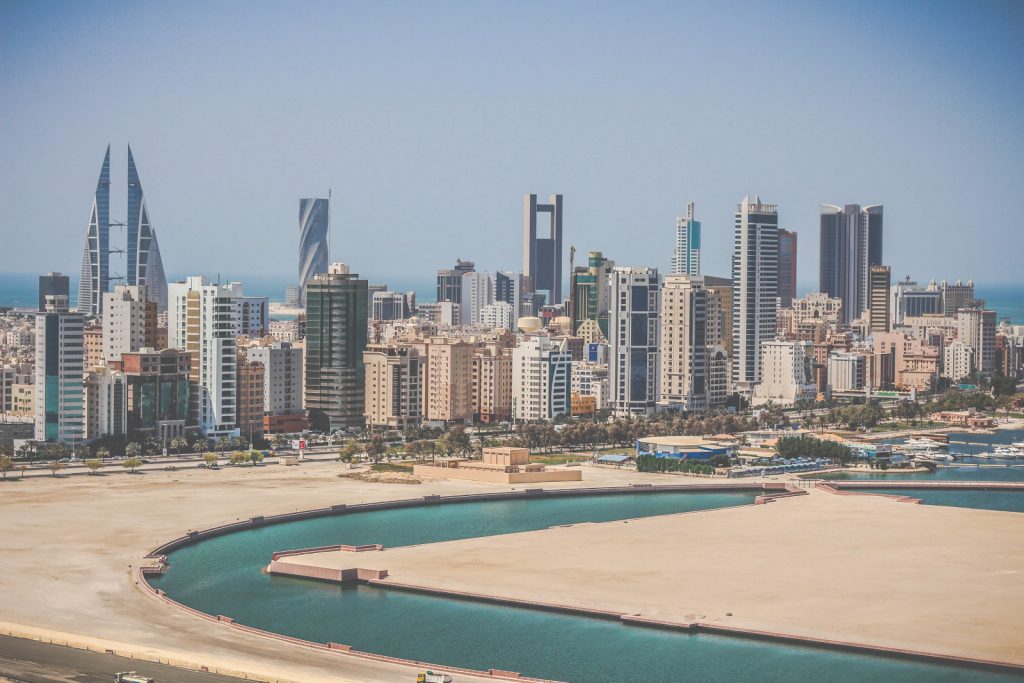Economic Overview
Bahrain was one of the first countries in the Middle East to discover crude oil. Though oil revenues continue to provide a considerable proportion of Bahrain’s GDP, the country is diversifying its economy expanding also in financial services, real estate and construction, and manufacturing sectors. Bahrain’s GDP grew by 2.5% in 2017 despite a stagnation of the oil sector.
The government has also encouraged domestic and foreign investment and as a result Bahrain has expanded also in heavy industries, banking and tourism recently. Bahrain is the main banking hub in the Gulf region, in addition to being a center of Islamic finance. Bahrain’s position at the centre of the Gulf allows easy access to every market in the Middle East.
In 2005 Bahrain became the first country in the Arab Gulf to sign a free bilateral trade agreement with the United States that allowed to facilitate trade flows and stimulate foreign investment. Under the agreement, tariffs on imports and exports were eliminated and conditions relating to trade in goods and services between them were relieved.
Bahrain is considered the fastest growing financial center in the Middle East, as the kingdom is based on a free and open economic policy. According to the Index of Economic Freedom, issued in 2011, Bahrain’s economy is the freest in the Middle East and North Africa region. Bahrain’s economy is also described as a modern economy, with its advanced infrastructure and solid communications network and due to the presence of many international companies that are based in Bahrain and work in various GCC states.
Taxes in Bahrain
Bahrain is a tax free economy with no withholding tax, no corporate tax, no income tax which significantly contributed to a great influx of foreign investors in Bahrain, with the exception, in limited circumstances, to businesses (local and foreign) that operate in the oil and gas sector or derive profits from the extraction or refinement of fossil fuels (defined as hydrocarbons). For these just mentioned companies, a tax rate of 46% is levied on net profits for each tax accounting period, irrespective of the residence of the taxpayer.
There is also a 1% ‘Social Insurance Tax’ on salaries to help fund unemployment benefits for all workers and a municipal tax is also payable by individuals or companies renting property in Bahrain.
VAT in Bahrain
The VAT will be introduced for the first time by the end of our current year. The representatives of the Member States of the Gulf Cooperation Council (GCC) confirmed the introduction of a formal Value Added Tax (VAT) system across all six Member States through the signing of a VAT Framework Treaty. The Treaty acts as the basis for the domestic VAT legislation in Bahrain by stipulating certain principles, which must be followed by all members, while allowing Bahrain to opt for different VAT treatments in relation to some supplies.
Vat will impact especially:
- Consumer and industrial products;
- Technology, media and telecommunications;
- Financial services;
- Real estate.
The VAT rate in Bahrain and all six GCC countries will be 5%. This is significantly lower than the OECD average VAT rate of approximately 19%.
Key Industries in Bahrain
Services Industries
Today, the services sector have been key drivers for Bahrain’s economy diversification: in fact they encompass Islamic and offshore banking, insurance and tourism. In the future, Bahrain’s service industry is expected to pilot Bahrain’s economic growth. In 2009, the finance sector contributed to nearly 27% of GDP and 40% of Bahrain’s total economic growth.
Heavy Industry Sectors
Heavy industries, which include petroleum processing and refining, aluminium smelting, iron pelletization, fertilizers and ship repairing and services industries remain the backbone of Bahrain’s economy making up respectively 58% and 41.5% of Bahrain’s GDP in 2010.
According to statistics, the Government’s attempt to diversify the Kingdom’s economy reducing dependence on oil, has brought Bahrain’s oil production decreasing from 48,610 barrels/day in 2007 to 48,520 barrels/day in 2008. Between 2005 and 2010, the volume of service exports has also grown by over 40% ; while non-oil exports have tripled over the same period.
Investing in Bahrain
Bahrain’s ecosystem and strategic location at the heart of the GCC makes it the perfect environment for investments finding all the tools and resources to test, launch, grow.
The Kingdom offers companies high standard industrial zones, such as the Bahrain International Investment Park (BIIP). The landmark industrial park offers 100% foreign ownership, a 10-year guaranteed 0% tax rate and duty free access to the GCC, GAFTA, and the USA. With full exemption from local employment for the first 5 years of operation, competitive land rental prices and utility costs, and comprehensive after-care support, BIIP is a world class, cost-effective industrial park for value added manufacturing and international services projects.
The government of the Kingdom of Bahrain seeks to attract foreign investments in a number of vital sectors such as:
- Financial Services;
- Industry Sector;
- Logistics Services;
- Real Estate;
- IT and Telecommunications.
Additional advantages that Bahrain offers to investors are:
- The freedom to repatriate and transfer profits and capitals;
- The freedom to import and export local and foreign currencies;
- No income, capital, sales, real estate, interest, or concession rights taxes;
- Bahrain hosts the GCC Commercial Arbitration Center, which settles commercial disputes between GCC citizens if the value of the dispute is higher than BD 15,000;
- The Kingdom of Bahrain allows foreigners to practice most of the business activities at a rate of 100%.

